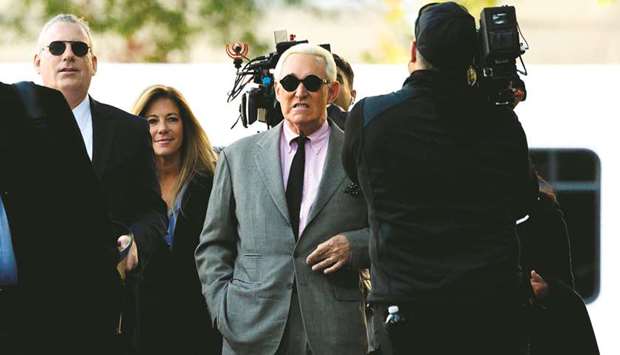The criminal trial of President Donald Trump’s long-time adviser Roger Stone began yesterday with the start of jury selection as he faces charges arising from former Special Counsel Robert Mueller’s investigation that documented Russian interference to help Trump win the 2016 US election.
The trial could renew attention on efforts by Trump’s 2016 campaign to capitalise on e-mails embarrassing to his Democratic opponent Hillary Clinton that US intelligence officials have concluded were stolen by Russian state-backed hackers.
It also coincides with the impeachment inquiry against the Republican president in the House of Representatives over Trump’s request that Ukraine investigate a Democratic rival, Joe Biden.
Mueller’s investigation, which concluded in March, led to criminal charges against several Trump advisers and campaign aides.
Stone is just the second from this group to plead not guilty. Paul Manafort, Trump’s former campaign chairman, was convicted by a Virginia jury last year and is now in a federal prison.
Stone, a self-described “dirty trickster” and “agent provocateur,” has pleaded not guilty to charges of obstructing justice, witness tampering and lying to the House of Representatives Intelligence Committee. That committee is now spearheading the impeachment inquiry.
Stone arrived yesterday at the courthouse in Washington to both jeers and cheers. “Hey, you’re going to get to see Manafort,” one person yelled, referring to Trump’s former aide who is now serving a prison sentence of 7-1/2 years. Others shouted “Roger Stone did nothing wrong.”
A Republican operative since the days of the Watergate scandal that forced President Richard Nixon to resign in 1974, Stone has been a friend and ally of Trump for some 40 years. He has a tattoo of Nixon’s smiling face on his back.
A jury was being chosen from a pool of more than 80 potential jurors.
Opening statements could begin as soon as today, US District Judge Amy Berman Jackson had said on Monday. The trial could last at least two weeks.
At the outset, Jackson made clear that having an opinion about Trump or working for the federal government were not disqualifying factors for jurors indicating bias against Stone.
Still, Stone’s lawyers quickly moved to strike from serving as a juror a woman who said she previously worked in former president Barack Obama’s administration and her husband worked at the Justice Department.
Jackson shot that effort down, saying the woman had credibly denied having an opinion on the Stone case.
Stone is accused of lying to US lawmakers investigating Russian election interference about the Trump campaign’s efforts to obtain the hacked emails that were published by the Wikileaks website to undercut Clinton’s candidacy.
The indictment refers to an October 2016 email from a “high-ranking Trump Campaign official” asking Stone to inquire about future releases of e-mails by “Organization 1,” a reference to Wikileaks. Stone responded that “Organization 1” would release “a load every week going forward.” The election was in November 2016.
The high-ranking official is believed to be former Trump adviser Steve Bannon, who among potential trial witnesses along with Trump’s former deputy campaign manager Rick Gates, radio host Randy Credico and conservative author Jerome Corsi.
Those four were mentioned in a questionnaire sent to prospective jurors listing people who could be called as witnesses or discussed during the trial.
Also mentioned was Wikileaks founder Julian Assange, though he is not expected to appear. Assange is in London fighting extradition to United States on charges of conspiring to hack government computers and violating a federal espionage law.
Court proceedings were interrupted when a man sitting in the back of the courtroom appeared to experience a seizure, leading to everyone being order out of the courtroom. The man later limped out of the courtroom before being placed on a stretcher and wheeled to an ambulance.

President Donald Trump’s former adviser Roger Stone enters the E Barrett Prettyman United States Court House in Washington, DC, yesterday.
